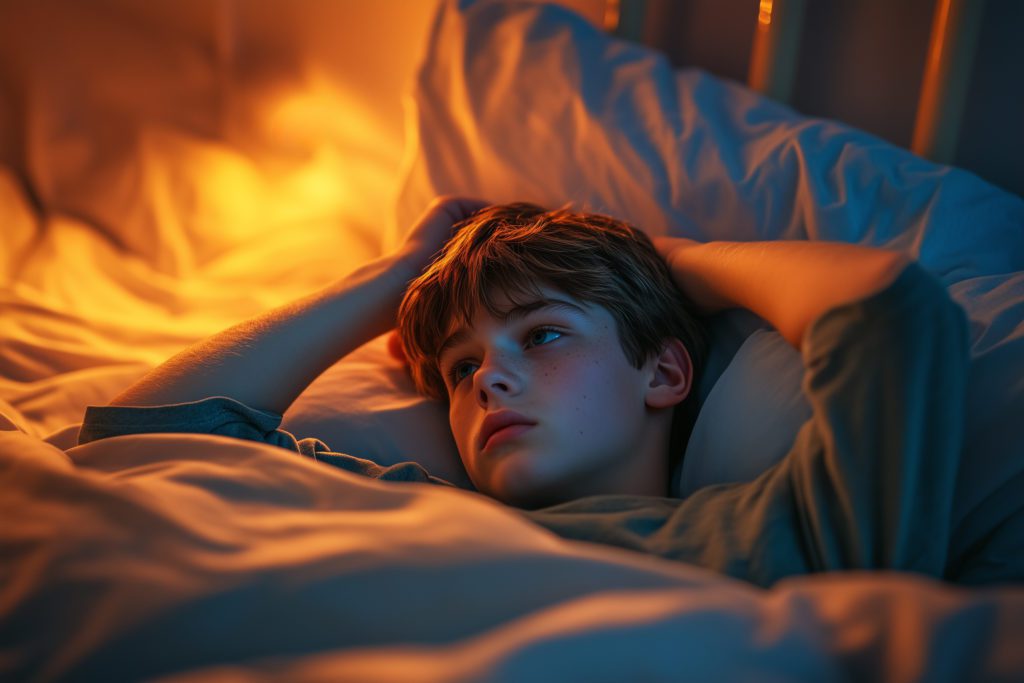
Late Nights and Early Mornings: The Impact of School Start Times on Teen Sleep
From circadian rhythms to school schedules, discover how we can optimize teen sleep for a healthier, more productive adolescence

Exploring the link between adolescent sleep patterns and school schedules
In the small hours of the morning, as the toaster pops up and the coffee brews, there’s a certain sector of our population—the teenagers—who are often just hitting the deepest part of their sleep cycle.
Unbelievably (and often painfully), it's during these critical moments of rest that teenage alarm clocks go off for school. And to make matters worse, this rude awakening often comes after what are frequently very late nights. Teenagers may have a reputation for being lazy, but as we’ll go on to explain, it’s not quite as simple as that.
To support the health and wellbeing of adolescents, it’s crucial to understand the delicate dance between teen sleep patterns and early school start times.
This article explores the relationship between school schedules and teenage rest, offering insights and solutions for navigating these challenges for happier, healther teens (and their siblings and parents!).
The Science of Teen Sleep
The natural adolescent sleep pattern changes by around two hours after puberty, meaning a teenager who previously fell asleep around 9:00 p.m. will now fall asleep naturally around 11:00 p.m. This shift in circadian rhythm naturally prompts a preference for later bedtimes and later wake-up times the next morning.
In teenagers, melatonin, the hormone responsible for regulating sleep, starts secreting later at night than it does in adults and children. This further delays their ability to fall asleep when the house has gone quiet and the neighborhood owls are twit-twooing.
A constant battle
Do you feel like you can’t get through to your son or daughter when it comes to getting them to go to sleep at a timely hour? The truth is, no matter how much Mom and Dad say, “Go to sleep! You’ve got class in the morning,” it's important to remember that your teenage son or daughter isn’t choosing not to go to sleep—this biological predisposition for late nights is not a choice but a developmental phase.
Unfortunately, when that alarm bell goes off at the crack of dawn, it interrupts the crucial REM sleep cycle, which is most abundant in the early morning hours. This misalignment can lead to chronic sleep deprivation, impacting teens' ability to function at their best—both academically and socially.
School Start Times and Their History
The standard for early mornings was set many, many decades ago. It was tailored more to societal and economic needs than our students’ biological clocks, of which there was little knowledge back then.
Early start times were Initially designed to accommodate agricultural routines, and until very recently, nobody has ever found a reason to change them—after all, starting school early in the morning has a definite advantage of preparing students for the 9-5 workday they’ll likely take on after graduating
Reassessing start times
In recent years, reports have highlighted growing evidence of the start times’ misalignment with adolescent sleep needs. The push for change has been slow, but there’s been a growing movement towards reevaluating these start times.
Research and advocacy have drawn attention to the benefits of aligning school schedules with students' natural sleep patterns, prompting some schools to experiment with later start times. These changes, though not widespread, have sparked important conversations about the health and wellbeing of our youth.
The Impact of Early School Start Times on Teens
It’s rare for any teenager to be chirpy and cheerful first thing in the morning, but the fact is, the effects of sleep deprivation extend far beyond morning grogginess.
Teens who consistently miss out on the recommended 8-10 hours of sleep may experience a host of negative outcomes, which can affect:
Academic performance
When sleep-deprived students hit math or French class, they may find themselves struggling with concentration, memory, and problem-solving. Instead of looking at the whiteboard, they find themselves drifting off, and maybe even nodding off.
This is not only frustrating and unpleasant in the short term—over the long term, the missed education can directly impact their grades and test scores.
Mental health
The relationship between sleep deprivation and mental health issues, including depression and anxiety, is well-documented. Since our teenage years are already extremely challenging due to other issues such as hormonal changes, academic pressure, peer pressure, social media, and bullying, being sleep deficient due to early starts can seriously affect a teen's emotional well-being.
Physical health
Obesity is a major concern for sleep-deficient teens, since lack of sleep affects the hormones that regulate hunger and appetite. Ghrelin, the hormone that signals hunger, increases with sleep deprivation, while leptin, which signals fullness, decreases. This imbalance can cause tired adolescents to overeat and gain weight. To exacerbate the situation, worn-out teens are unlikely to want to engage in physical activity.
A lack of sleep can also cause teens to have a weakened immune function, meaning they’re less able to fight off infections. During sleep, the body produces proteins called cytokines, that help the immune system respond to infections and inflammation, so if teens aren’t getting enough shut-eye, they’ll have less of these protective cytokines when they need them. Antibodies and infection-fighting cells will also be less readily available, making teens more susceptible to viruses and bacteria.
Safety risks
One of the most direct and alarming safety concerns associated with early school start times is drowsy driving, where teens may experience microsleep episodes as they try to concentrate on the road ahead.
Teenagers are already at a disadvantage from other motorists since they’re less experienced drivers, so their likelihood of accidents increases to worrying levels when they’re sleep deprived.
Studies have shown that 55% of drowsy driving crashes involve those under 25 years old—and it’s drivers aged 16-25 years who are at the greatest risk of falling asleep at the wheel. The risk is particularly high in the morning rush to school, where early start times force teens to be on the road during their biological sleep time.
A Case Study: Shifting School Start Times
In one experiment to move school start times later, the outcomes were extremely positive. In 2016, schools in Seattle moved school start times from 7:50 a.m. to 8:45 a.m. saw students averaging an additional 34 minutes of sleep per night. This led to improved grades and reduced absenteeism.
Similar initiatives across the country have echoed these results, with students reporting better focus, higher energy levels, and improved overall mental health.
FAQ
What role does technology use play in teen sleep patterns?
Late-night use of phones, computers, and tablets exposes teens to blue light, which disrupts melatonin production, delaying sleep onset. This compounds their natural preference for staying up late, reducing overall sleep duration and worsening sleep deprivation caused by early school start times.
How do extracurricular activities influence teen sleep schedules?
Evening activities like sports or clubs often push bedtimes later, reducing sleep. With early school start times, teens face a sleep deficit that affects focus, mood, and energy. Balancing these activities with adequate rest becomes challenging, especially during busy school weeks.
How does part-time employment among teens affect their sleep and academic performance?
Teens working late shifts often sacrifice sleep, leading to exhaustion, poor academic performance, and reduced concentration. Balancing school, work, and sleep becomes challenging, making them more prone to the negative effects of early school starts and insufficient rest.
Are there any economic implications of changing school start times?
Research indicates that delaying school start times leads to improved academic performance and better future earnings for students. Additionally, economic models show that the long-term benefits, such as higher productivity and reduced healthcare costs, outweigh the initial expenses of implementation.
How do early school start times impact low-income students differently?
Low-income students may face unique challenges, such as noisy living environments, limited access to quiet study spaces, or longer commutes, making it harder to adjust to early start times. This exacerbates sleep deprivation and academic disparities.
How do cultural differences impact perceptions of appropriate school start times?
Cultures valuing high academic achievement may favor early starts to maximize instructional hours, while others prioritize health, pushing for later starts. Societal attitudes toward work-life balance and child development influence how nations address teen sleep and education conflicts.
What strategies can parents implement to help teens get adequate sleep despite early school start times?
Parents can enforce regular sleep schedules, limit screen use and caffeine in the evening, and create a calm, dark sleep environment. Advocating for later start times or cutting back on over-scheduling activities are also steps families can take to improve teens' sleep health.

Written by
Georgia Austin
Professionally trained copywriter, editor, and content marketing strategist with over 7 years of experience—working with brands like Nike, Siemens, Toshiba, Tommy Hilfiger, Culture Trip, and Klook.
Download Pillow
Get help
Press & News
Legal
Connect
X (Twitter)
Company
Copyright © Neybox Digital Ltd.



